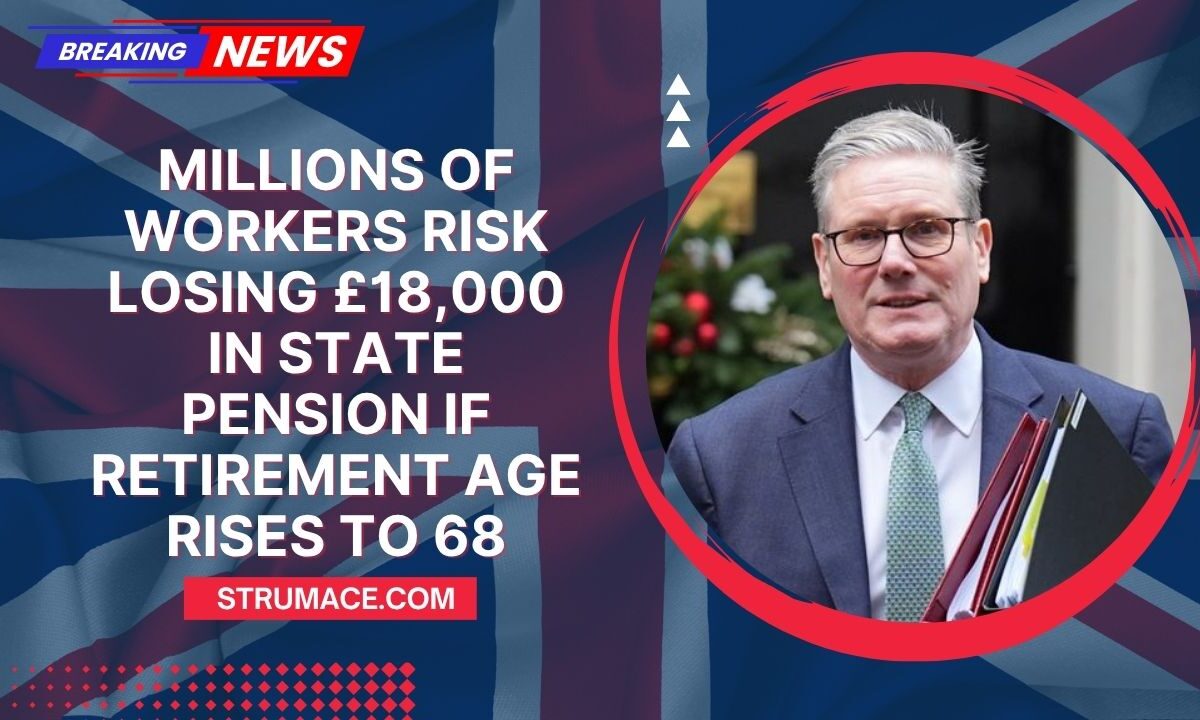Recent findings suggest that workers currently aged 51 to 53 may face a significant loss of up to £18,000 in state pension if the pension age increases to 68 earlier than expected.
This concern has emerged due to a government review assessing the sustainability of current pension costs.
Potential Acceleration of State Pension Age to 68
The current state pension age is 66, with a phased rise to 67 scheduled between 2026 and 2028. The next planned increase to 68 is officially set for the mid-2040s, targeting individuals born after April 6, 1977.
However, wealth management firm Rathbones warns that following the current review—set to conclude in 2029—the Government might accelerate the increase, moving the timeline forward to 2039–2041.
This would directly affect individuals now aged 51, 52, and 53, who would then have to wait an extra year to receive their state pension.
Triple Lock and Future Pension Loss Estimates
Under the state pension triple lock, annual payments rise by the highest of:
- Inflation
- Average earnings
- Or 2.5%
Rathbones estimates the annual state pension could reach:
- £17,774 for those aged 51 today by the time they turn 68.
- £17,340 loss for a current 52-year-old missing a year.
- £16,918 loss for someone aged 53 if retirement is delayed.
This assumes the triple lock remains, meaning losses could be even higher depending on economic conditions.
Government Stance on Pension Reviews and Triple Lock
By law, the UK Government must review the state pension age every six years. Two new official reports are currently underway to assess when the increase to 68 should occur. These reviews will consider:
- Public expenditure
- Population changes
- Life expectancy trends
Despite ongoing debate about the affordability of the triple lock, the Government has indicated that upcoming reviews should assume its continuation.
A separate warning from the Institute for Fiscal Studies (IFS) suggests that without changes to the triple lock, the retirement age may need to reach 74 by 2069 to manage costs.
Rising Financial Pressure on Future Retirees
In response to growing concerns, a new Pensions Commission has been formed to tackle retirement poverty. It revealed that:
- Nearly half of UK working adults aren’t saving into pensions.
- About 15 million individuals are under-saving, despite widespread auto-enrolment in workplace pensions.
Rebecca Williams, a financial planning expert at Rathbones, highlights the issue, stating:
“Those in their early 50s are now the most vulnerable, as they might face reduced benefits and a less generous system compared to today’s retirees.”
She adds that many clients in their late 40s and early 50s are seeking help to adjust their retirement plans due to the uncertain future of pensions.
Why Individual Financial Planning Is More Important Than Ever
Williams stresses that relying solely on the state pension is no longer sufficient for a comfortable retirement. She advises building a diversified retirement strategy that includes:
- Workplace pensions
- Private savings
- Pension tax relief benefits
She concludes that “cracks are beginning to show” in the current retirement system, making early financial planning critical.
The anticipated shift in the state pension age to 68 could financially impact millions currently in their early 50s. With potential losses exceeding £17,000, it’s vital that individuals plan ahead by strengthening their retirement savings strategy.
While the Government’s commitment to the triple lock provides short-term reassurance, long-term reforms appear inevitable. Those approaching retirement should take proactive steps now to secure a stable financial future.
FAQs
What is the current state pension amount in the UK?
The full state pension is currently £230.25 per week, amounting to nearly £12,000 per year, assuming you’ve paid sufficient National Insurance contributions.
Who could be affected by the accelerated state pension age increase?
People who are currently aged 51 to 53 might lose up to £18,000, as they would need to wait longer to access their state pension if the age rises to 68 by 2039–41.
What is the triple lock, and will it stay?
The triple lock ensures pensions increase annually by the highest of inflation, earnings, or 2.5%. While the Government has promised to maintain it for this Parliament, its long-term future remains uncertain due to affordability concerns.
